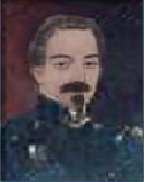José Ignacio De Gorriti on:
[Wikipedia]
[Google]
[Amazon]
 General José Ignacio de Gorriti (1770 – 9 November 1835) was an
General José Ignacio de Gorriti (1770 – 9 November 1835) was an
Argentine
Argentines, Argentinians or Argentineans are people from Argentina. This connection may be residential, legal, historical, or cultural. For most Argentines, several (or all) of these connections exist and are collectively the source of their ...
statesman, soldier and lawyer. He was a representative to the Congress of Tucumán
The Congress of Tucumán was the representative assembly, initially meeting in San Miguel de Tucumán, that declared the independence of the United Provinces of South America (modern-day Argentina, Uruguay, part of Bolivia) on July 9, 1816, ...
which on 9 July 1816 declared the Independence of Argentina.
Gorriti was born in Jujuy
San Salvador de Jujuy (), commonly known as Jujuy and locally often referred to as San Salvador, is the capital and largest city of Jujuy Province in northwest Argentina. Also, it is the seat of the Doctor Manuel Belgrano Department. It lies near ...
to Feliciana Coeto and Ignacio de Gorriti Navarro, members of the local gentry. He and his brother, Juan Ignacio de Gorriti (later a prominent priest and lawmaker), studied at the Montserrat School in Córdoba Córdoba most commonly refers to:
* Córdoba, Spain, a major city in southern Spain and formerly the imperial capital of Islamic Spain
* Córdoba, Argentina, the second largest city in Argentina and the capital of Córdoba Province
Córdoba or Cord ...
. In 1788 he entered the University of Chuquisaca, graduating in canonical and civil law. He was forced to return to Jujuy on the death of his father to look after the family and their interests. In 1802 he married Facunda Zuviría.
In 1810, following the May Revolution
The May Revolution () was a week-long series of events that took place from 18 to 25 May 1810, in Buenos Aires, capital of the Viceroyalty of the Río de la Plata. This Spanish colony included roughly the territories of present-day Argentina, ...
, Gorriti became an active and vocal supporter of the revolutionary cause. He campaigned with the Army of the North and alongside General Martín Güemes, and was subsequently elected by a grateful Salta
Salta () is the capital and largest city in the Provinces of Argentina, Argentine province of Salta Province, the same name. With a population of 618,375 according to the 2010 census, it is also the List of cities in Argentina, 7th most-populous ...
to the Tucumán Congress, serving in 1816 for the declaration. When the Congress moved to Buenos Aires
Buenos Aires, controlled by the government of the Autonomous City of Buenos Aires, is the Capital city, capital and largest city of Argentina. It is located on the southwest of the Río de la Plata. Buenos Aires is classified as an Alpha− glob ...
in 1817, he resigned to continue to work in Salta with Güemes. He had a distinguished role in the campaign, organising the gaucho
A gaucho () or gaúcho () is a skilled horseman, reputed to be brave and unruly. The figure of the gaucho is a folk symbol of Argentina, Paraguay, Uruguay, Rio Grande do Sul in Brazil, the southern part of Bolivia, and the south of Chilean Patago ...
cavalry and in 1820 won a key battle against the royalists.
Gorriti was made governor of Salta Province
Salta () is a Provinces of Argentina, province of Argentina, located in the northwest of the country. Neighboring provinces are from the east clockwise Formosa Province, Formosa, Chaco Province, Chaco, Santiago del Estero Province, Santiago del Es ...
in 1822 and served with distinction, having a second term between 1827 and 1829. He had several further military successes both against Spanish
Spanish might refer to:
* Items from or related to Spain:
**Spaniards are a nation and ethnic group indigenous to Spain
**Spanish language, spoken in Spain and many countries in the Americas
**Spanish cuisine
**Spanish history
**Spanish culture
...
forces and against the Federals under Juan Facundo Quiroga
Juan Facundo Quiroga (27 November 1788 – 16 February 1835) was an Argentine caudillo (military strongman) who supported federalism at the time when the country was still in formation.
Early years
Quiroga was born in San Antonio, La Rioja ...
. Quiroga's later success, however, obliged him to go in exile to Bolivia
Bolivia, officially the Plurinational State of Bolivia, is a landlocked country located in central South America. The country features diverse geography, including vast Amazonian plains, tropical lowlands, mountains, the Gran Chaco Province, w ...
, where he died penniless with many children.
Gorriti's daughter was Juana Manuela Gorriti
Juana Manuela Gorriti Zuviria (15 June 1818 – 6 November 1892) was an Argentine writer with extensive political and literary links to Bolivia and Peru. She held the position of First Lady of Bolivia from 1848 to 1855.
With the publication o ...
, the writer, who married future Bolivian President, Manuel Isidro Belzu.
1770 births
1835 deaths
People from the Viceroyalty of the Río de la Plata
People from San Salvador de Jujuy
Argentine people of Basque descent
Argentine people of Italian descent
19th-century Argentine lawyers
Members of the Congress of Tucumán
Argentine military personnel
Governors of Salta Province
People of the Argentine War of Independence
University of Charcas alumni
18th-century Argentine lawyers
{{Argentina-mil-bio-stub